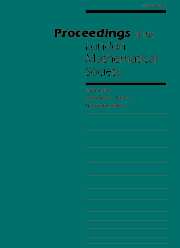Article contents
ON PRINCIPAL BLOCKS OF p-CONSTRAINED GROUPS
Published online by Cambridge University Press: 13 February 2002
Abstract
A theorem of K. W. Roggenkamp and L. L. Scott shows that for a finite group G with a normal p-subgroup containing its own centralizer, any two group bases of the integral group ring $\mathbb{Z} G$ are conjugate in the units of $\mathbb{Z}_{p}G$. Though the theorem presents itself in the work of others and appears to be needed, there is no published account. There seems to be a flaw in the proof, because a ‘theorem’ appearing in the survey [K. W. Roggenkamp, ‘The isomorphism problem for integral group rings of finite groups’, Progress in Mathematics 95 (Birkhäuser, Basel, 1991), pp. 193--220], where the main ingredients of a proof are given, is false. In this paper, it is shown how to close this gap, at least if one is only interested in the conclusion mentioned above. Therefore, some consequences of the results of A. Weiss on permutation modules are stated. The basic steps of which any proof should consist are discussed in some detail. In doing so, a complete, yet short, proof of the theorem is given in the case that G has a normal Sylow p-subgroup.
2000 Mathematical Subject Classification: primary 16U60; secondary 20C05.
- Type
- Research Article
- Information
- Copyright
- 2002 London Mathematical Society
- 10
- Cited by




